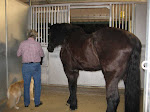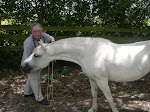Last month I went to a meeting that takes place among horse people in my area. Vets, farriers and other horse experts come together and people can bring their horses for evaluation and treatment.
I met a young woman who had her first horse since she was a child. Like many, if not most, of us she dreamed of owning a black stallion. Unlike many this is what she bought, a two year old black Arabian colt. Now when he was four she confessed she was afraid of him. Despite two years of professional training and gelding he was still too much horse for her.
It is a story I’ve heard over and over. Someone has dreamed of having a horse and finally reaches a place in their lives where they can have one. So they set out to get their dream horse. Usually the afore mentioned black stallion. It is the sort of mistake that drives people out of the world of horses on a regular basis.
What the first time horse owner really needs is a twenty to thirty year old horse with many years of experience and training. Such a horse may not be totally sound, arthritis takes its toll on all of us in time, but with proper care it can teach the first time horse owner many things before it passes on. Unlike a younger horse, while this older horse may need special care it will most likely not get in trouble because of racing around and injuring itself. When something happens an experienced old horse will stand there and wait for some human to show up and extricate it from its predicament. The young horse will panic and run up an unbelievable vet bill in no time. I simply cannot say enough good things about the older horse for the first time horse owner.
In fact, if the first time horse owner is bound and determined to have that black stallion they can find one in that age bracket and fulfill their dream in a much safer manner than by going out and acquiring ANY young horse. I don’t recommend that the tyro horse owner begin with a stallion because stallions do have special needs, but if nothing else will do then by all means get a stallion of twenty plus with lots and lots of training and then place yourself in an environment that will help you learn to cope with your black stallion.
What does this little tirade have to do with being a Lazy Trainer? Well, in my next blog I’ll introduce my black stallion and tell you how he taught me to be a better, more effective, horse trainer; as well as enabling me to increase my status as a Lazy Trainer.
Wednesday, April 30, 2008
Tuesday, April 29, 2008
Whose Fault Is It?
I am a lazy person. I've been assured of this many times in the past by family and teachers, so of course it must be true.
"It's never the horse. It's always the rider."
I heard that quote over and over as a kid when I was learning to ride. It was the response I got every time I said, "This horse won't do what I tell her too."
I used it myself when I began teaching and students whined, "This horse won't do what I tell it to."
The fact is the horse was ALWAYS doing what it was told to. It wasn't until I was involved in higher level dressage when I whimpered, "I know it is me, not the horse, but it is so tempting to blame her." that a teacher pointed out, "It really doesn't matter whose fault it is. You are the one who wants to do this. The horse would rather be out in pasture, hanging out with her friends, so it is up to YOU to make this possible. If you don't want it enough to make it happen it isn't going to happen."
My epiphany at that moment was that, no matter what animal I'm dealing with, I, the human, am the one that has brought this animal into my world. It is up to me to make things right. When I introduce an animal into our civilized world it is my job to take care of the animal and keep it safe. It is up to me to make sure the animal doesn't get into trouble with other people and animals.
It is not possible to accomplish my job of taking care of a horse, dog, cat or any other animal if I focus on the idea that a problem is the animal's fault. The animal is being what it is and I'm the one responsible for bringing it into an unnatural enviroment. Therefore it is my responsibility, no matter what my dog or horse or cat is doing, to make certain things go well.
If I've rescued an animal I cannot look at previous owners, circumstances or anything in the past and spend time blaming. That will not solve the problem in the now. I need to get on with resolving the issues that are before me right now.
In fact, when I look at life in general, I realize that as long as I focus on the idea that my problems, no matter what they are, are someone else's fault I cannot make my life better. I cannot make an animal's life better. I cannot make another person's life better. I have to own my own life and problems before I can get down to fixing anything.
In order to accomplish anything I have to be clever about it. So my first line of attack concerning any problem is to own it. My dog is barking because...my horse won't canter because...my cat is clawing the sofa... because I haven't trained it differently.
There it is; the whole Secret to Being a Lazy Trainer. It is always up to me. No one else can or will do it for me. Therefore I have to train myself first.
"It's never the horse. It's always the rider."
I heard that quote over and over as a kid when I was learning to ride. It was the response I got every time I said, "This horse won't do what I tell her too."
I used it myself when I began teaching and students whined, "This horse won't do what I tell it to."
The fact is the horse was ALWAYS doing what it was told to. It wasn't until I was involved in higher level dressage when I whimpered, "I know it is me, not the horse, but it is so tempting to blame her." that a teacher pointed out, "It really doesn't matter whose fault it is. You are the one who wants to do this. The horse would rather be out in pasture, hanging out with her friends, so it is up to YOU to make this possible. If you don't want it enough to make it happen it isn't going to happen."
My epiphany at that moment was that, no matter what animal I'm dealing with, I, the human, am the one that has brought this animal into my world. It is up to me to make things right. When I introduce an animal into our civilized world it is my job to take care of the animal and keep it safe. It is up to me to make sure the animal doesn't get into trouble with other people and animals.
It is not possible to accomplish my job of taking care of a horse, dog, cat or any other animal if I focus on the idea that a problem is the animal's fault. The animal is being what it is and I'm the one responsible for bringing it into an unnatural enviroment. Therefore it is my responsibility, no matter what my dog or horse or cat is doing, to make certain things go well.
If I've rescued an animal I cannot look at previous owners, circumstances or anything in the past and spend time blaming. That will not solve the problem in the now. I need to get on with resolving the issues that are before me right now.
In fact, when I look at life in general, I realize that as long as I focus on the idea that my problems, no matter what they are, are someone else's fault I cannot make my life better. I cannot make an animal's life better. I cannot make another person's life better. I have to own my own life and problems before I can get down to fixing anything.
In order to accomplish anything I have to be clever about it. So my first line of attack concerning any problem is to own it. My dog is barking because...my horse won't canter because...my cat is clawing the sofa... because I haven't trained it differently.
There it is; the whole Secret to Being a Lazy Trainer. It is always up to me. No one else can or will do it for me. Therefore I have to train myself first.
Subscribe to:
Comments (Atom)









